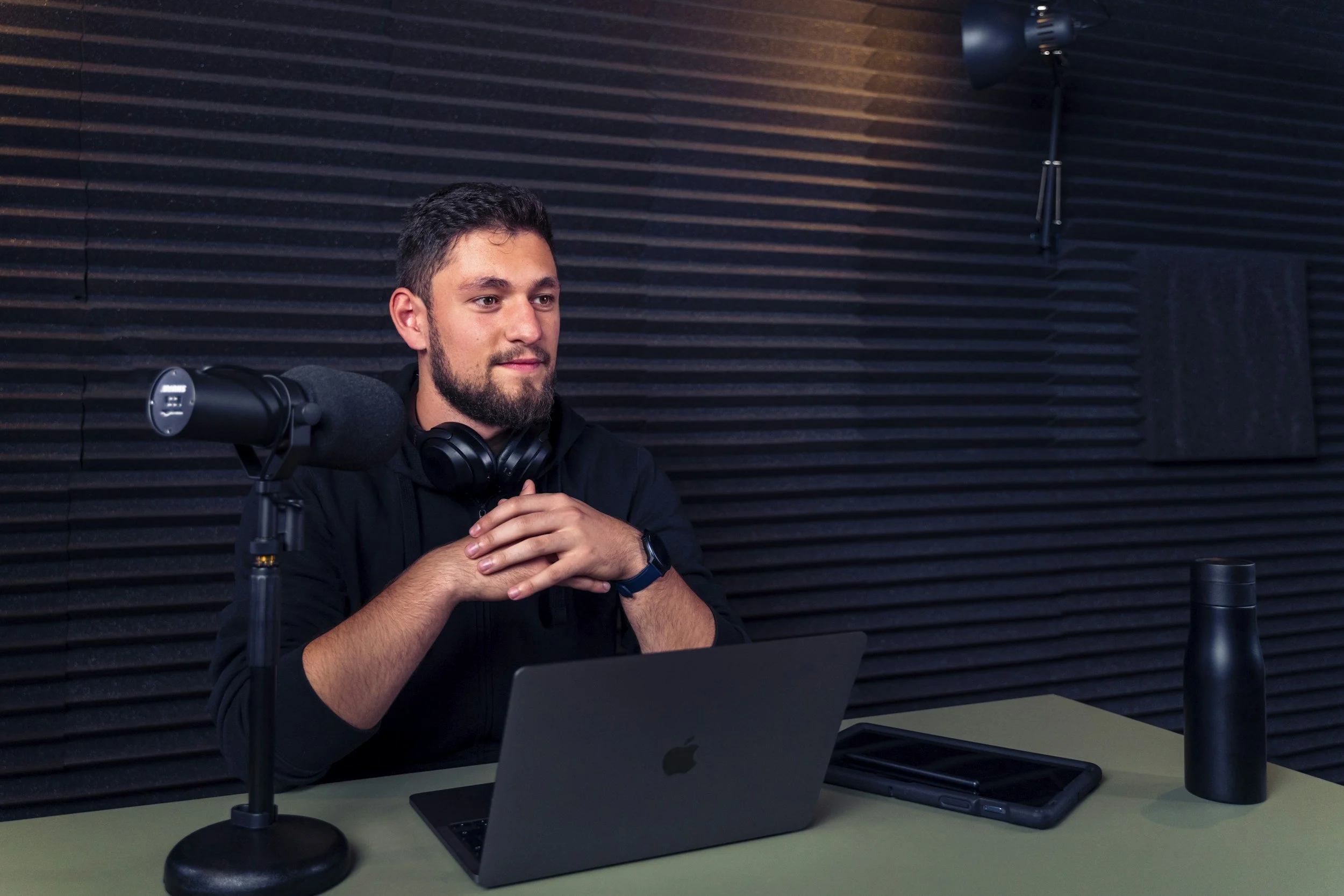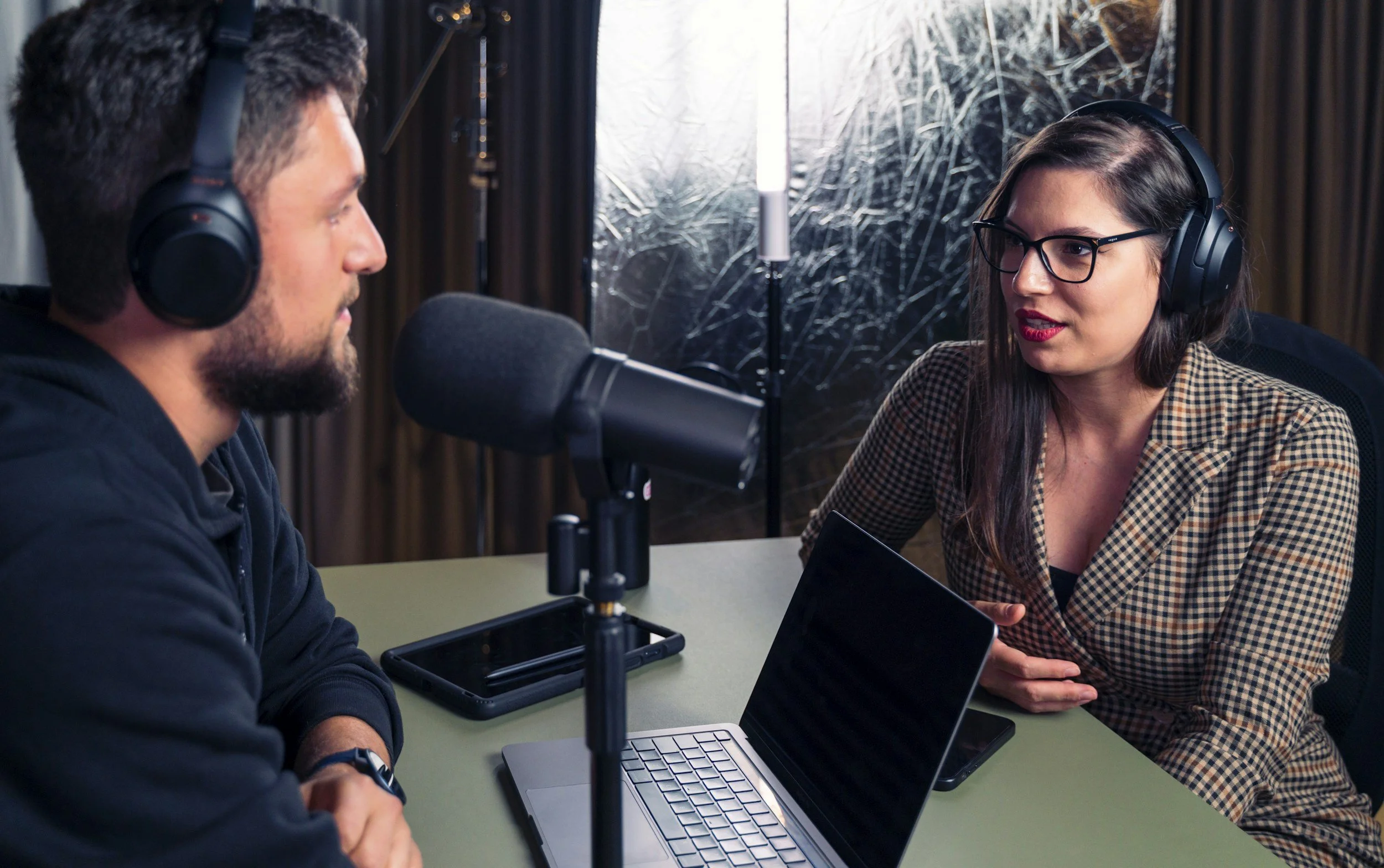If you’re just starting out in the podcasting process, deciding which hosting platform is best for you and your content can feel overwhelming.
Here is a breakdown of the top 17 platforms and the key features that can help you make a more informed decision based on your goals, audience, and how you plan to use your podcast.
Podcasts are a great way to connect with a large audience and increase the visibility of a personal brand or business. If you’re thinking about creating your own, whether as an individual creator or as part of a company’s marketing efforts, partnering with a B2B podcast agency can help simplify the process.
Working with the right partner ensures your podcast is produced at a professional level without putting additional strain on your team. From production through distribution, each episode can also be turned into multiple marketing assets, all repurposed from a single recording.
Podcast Hosting Platforms Explained:
So, the question that’s probably first and foremost in your mind is what is a podcast hosting platform? A simplified explanation is that they are an online distribution and storage service for your podcast audio. While not every platform has the same features or price points, they often include key elements like analytics, RSS feed generation, bandwidth and directory distribution for your podcast.
Since there is such a wide range of podcast hosting platforms available to you, it is important to establish what it is that you are really looking for, and this list will provide you with a wide variety of choices to consider, so you can find the best fit for you, whether you’re looking to make podcasting a career, or you just want to get your content out there.
Here are the best podcast hosting platforms for 2026:
1. Ausha
If you are looking for a platform that goes beyond simple hosting to actually help you grow your audience, Ausha is the premier choice. Known as the first "marketing-first" podcast platform, it is specifically designed for creators and businesses who want to treat their podcast as a serious growth engine. Its streamlined interface and automated tools make it easy to distribute, promote, and analyze your show all in one place.
Cost: 0$ - $15+/month (includes a free trial)
Key Elements:
Podcast Search Optimization (PSO) – Ausha is a pioneer in podcast SEO, offering a dedicated "Search Control" panel that helps you track keywords and optimize your metadata so your show ranks higher on Apple Podcasts and Spotify.
Social Media Manager – You can schedule posts to X, Facebook, Instagram, and LinkedIn directly from the dashboard, ensuring your promotional efforts are consistent without needing external tools.
Smart Player & Smartlink – Ausha provides a highly customizable audio player and "Smartlinks" that include built-in call-to-action (CTA) buttons and newsletter opt-in forms to help convert listeners into loyal fans.
Video Clips (Audiograms) – Easily generate eye-catching video snippets from your audio to share on TikTok, Reels, or YouTube Shorts, which is essential for modern social media discovery.
Ausha Intelligence (AI) – The platform features integrated AI tools that can automatically generate your episode titles, descriptions, social media posts, and even transcripts to save you hours of production time.
Deep Analytics – With IAB v2 certified statistics, you get incredibly granular data on your listeners’ habits, including retention rates, peak listening times, and geographical distribution.
Global Distribution – Distribute your podcast to over 22 directories (including YouTube and SoundCloud) with a single click, ensuring your content is accessible anywhere in the world.
2. Buzzsprout
This platform is a good option if you are just starting out in podcast production because it is very user friendly, and includes a wide variety of tools to streamline common processes and edit episodes, making it easier for the less experienced to engage with the available features.
Cost: $0 - $24/month, and they offer a 90 day free trial
Key Elements:
Magic Mastering - this is an AI tool exclusive to Buzzsprout, and it takes out any background noise without you having to do your own sound editing
Embedded player - suited to many platforms
Transcription - you can not only transcribe your episodes, but add the transcription alongside the audio on your website
Analytics - you will be provided with engagement, device, and distribution platform statistics, and reports about popular episodes and podcast performance over specific periods of time including the last week, month, and beyond
Content Creation - you can easily make short snippets from your podcast episode
3. Transistor
Transistor is a great option whether you are working independently, within a small group or you are a business leader of a large company. If you want the option to host more than one podcast, this is the platform for you. It also allows you to easily convert your podcast into a video format that can be posted to platforms like YouTube, plus, the storage is unlimited.
The versatility of the platform is evident in the fact that they not only have a wide variety of features, making it a platform fit for any type of podcast, but over the past 7 years, they have worked with 26 000 different podcasts.
Cost: $19 - $199+, and they offer a 14 day free trial
Key Elements:
Unlimited Podcasts - you can create, host and upload as many podcasts as you want with limitless storage
Monetization - the platform is compatible and integrated with Patreon and Apple Podcasts, so ways to monetize are included in the platform
AI - with built in AI tools like transcription you can make your podcast more accessible
Analytics - you will be provided with important information about listeners, performance and comparisons, and with charts about your episode’s and podcast’s statistics
Website customization - you have the option to adapt your page to fit your brand
Private podcasts - you have the option to create podcasts exclusively for a private audience, and to create touch points like QR codes and emails for your audience
4. Libsyn
Libsyn is a tried and true podcast hosting platform, which is why it is one of the most popular. This platform prioritises guiding you through not only your podcast analytics, but through ways to improve audience engagement and podcast performance through the provision of interactive learning materials. Libsyn has plans that cater to every experience level, and allows for customisation in accordance to your brand image.
Cost: $5 - $150/month
Key Elements:
Analytics - you are provided with specific time and episode data on advanced analytics plans
Publishing and Storage - there are options to store and publish video content through the platform, and you can schedule and auto-publish
Integration
Headliner - you can make short snippets of marketing content from your episode
ONPUBLISH - you can publish to over 20 different apps through the platform
GLOW - this podcast subscription integration means that you can develop membership programs for subscribers which can include incentives like exclusive or ad-free content and early-access
5. RSS.com
This platform is all about producing quality content, and because of this it is tailored towards anyone regardless of their initial level of experience due to its wide range of different features, each of which serve a different purpose and type of podcast best. If monetization and growth are your priority, RSS.com is a good place to start because of the plan affordability, distribution channels and monetization tools.
Cost:
Education and Non-profit Plan: $4.99/month
For Individuals: $11.99/month
For Podcast Networks: $18.75/month
Key Elements:
Website - you are given a free website with your plan that you can customise
Unlimited Content Storage: you can make and distribute as many episodes as you want without restriction
Interface - the platform is very user-friendly, making it easy for you to create and publish your podcast
Distribution - the platform’s connection to the most popular podcast directories means that your content can be automatically sent to channels like Apple Podcasts and Spotify
AI - there is an AI tool that generates transcripts for the episode
Analytics - RSS.com provides you with engagement, growth and behavioural statistics that are IAB Certified
6. Captivate
Captivate is built for podcasters who prioritize growth, analytics, and monetization. It offers business friendly tools that support long-term podcast strategy, making it a solid option for B2B and brand-led podcasts as well as independent creators. It’s widely used by business-focused podcasters who treat their show as a long-term marketing asset.
Cost: $17 - $90/month
Key Elements:
Show Notes - there is a tool that will create and publish notes about each podcast episode
Guest Bookings - you can contact guests through the platform and the details about episode guests will be automatically attached to the episode in which they appear
Monetization - there are different ways to monetize your content, like with exclusive and early access content, one click media kit, ad insertion and listener donations
Private and Public Podcasting - for internal and public projects
Captivate Growth Labs - you can interact with other podcasters and gain valuable advice
Integration - of many things ranging from Zapier and Squadcast to WordPress and Mailchimp
Lack of Limits - no limits on storage or the amount of episodes you can produce
7. Podbean
If you are just starting out and want a platform that is easily accessible, that prioritizes a simple distribution process, this is the best choice for you. It is simple to upload and share your content here because it is an app, structured to simplify the process and streamline workflow.
Cost: $0 - $79/month
Key Elements:
Monetisation tools - there are a lot of integrated options for monetisation including ways to find and insert ads and Apple and Patreon connectivity
Website options - Podbean provides you with a website that you can alter to best suit how you want to promote your content
AI - with Podbean’s AI tools you can improve your episode quality by removing background audio, editing the episode and providing transcriptions
Social Media compatibility - you can share to your social media platforms through Podbean
Hosting is unlimited - you are not limited on how many podcasts you host or distribute, or on how long episodes are
Embedding - you have the option of embedding podcast players into your other content
8. Simplecast
Simplecast is one of the more expensive podcast hosting platforms, but this is mainly because of the depth of the analytics, the level of customisability in your show’s partnered website and the ability to create more marketing assets like short clips, making it a good fit for independent podcasters. You can learn a lot about your listeners here, and adjust your content accordingly.
Cost: $15 - $35/month, and they offer a 2 week free trial and customisable plans
Key Elements:
Recast - this is a tool that helps you create and publish short clips from the episode on social media platforms
Website and Simplecast 2.0 API - the website is customisable and you can use your own material and further customize aspects like the dashboard and the listening app using Simplecast 2.0 API (only with specific plans)
Monetization Marketplace - the Simplecast AdsWizz Marketplaces allows for the sale and purchase of ads
Analytics - gives you insight into the typical listener data, as well as engagement levels, retention rates and broad data about how quickly your audience consumes your content
Web Players:
Standard Simplecast Audio Player
Simplecast Show Player
Simplecast Mini Player
9. Spreaker
With the Spreaker’s wide variety of features, this platform is extremely versatile, making it a great option for professional podcasters and for individuals just starting out, because you can complete the whole podcasting process within the platform.
Cost: $0 - $250/month
Key Elements:
Live Stream - you can boost engagement by providing your audience with live content, and best of all, they can respond in real time too using the chatbox
Ad Filling - you can block out specific places in the episodes that you want filled with an advertisement, and the platform will add one for you
Analytics - you are provided with data about your listeners and their engagement
Support from Listeners - the platform gives listeners the option to support your podcast through a paid subscription
10. Acast
Acast prioritises podcast growth by giving you access to the platform’s ad marketplace and tools that analyse listener data to better understand their ad preferences, as well as prompt financial contributions from listeners.
Cost: $0 - $29.99/month
Key Elements:
Growth Features - you can turn your content into further marketing assets like video snippets, and you can customise the podcast website to boost engagement
Import and Publishing - you will have one-click migration for your podcast, and adapt and schedule how and when you publish each episode
Analytics - you can analyse patterns within your listener base and collect real-time data as well
11. RedCircle
RedCircle prioritises podcast monetisation over all other features, making this a good platform for independent creators looking to become professionals.
Cost: $14.99 - $99.99/month
Key Elements:
Cross-Promotion Feature - you can promote your podcast to others through the platform
Ad Diversity - you can incorporate premade and host read ads into your podcast
Insertion Options - you can insert content using the dynamic feature, which helps productivity in adding CTA’s, ads or any additional content
Analytics - data on episode performance and listenership
12. Castos
If you want to take some of the pressure off of yourself if you’re a beginner, or your podcasting team if you are a business leader, and you want to produce exclusive or private content, Castos is the best option for you. They offer lots of valuable features, but most notably, offer you the opportunity for your content to be edited by Castos Productions.
Cost: $29 - $699/month
Key Elements:
Customisable Website - you can integrate WordPress into your site and tailor it to best suit your podcast
Video Features - you can host video content and publish it on YouTube through the platform
Private Podcasting - for internal projects
Transcription - you have the option to generate transcriptions for each episode, and the amount you can do for free is altered by your plan level (typically between 10-100)
Analytics - includes detailed data about listeners, like which device and listening platform they use, demographics and more
13. Spotify for Podcasters (Anchor)
Spotify for Podcasters, or Anchor, is a free distribution platform that is best suited to anyone just starting out in podcasting, or who is considering giving podcasting a try. The platform is user-friendly and provides you with a base-line of features that can help you learn the ropes as a beginner.
Cost: Free
Key Elements:
Unlimited Storage - you can create and save as much content as you want without limitation
Analytics - you are provided with basic data about your listeners like where they listen, regarding both location and platform and general engagement statistics
Engagement Features - you can interact with your audience through polls and other written communication forms, and they have the ability to donate to your podcast
Partnership and Collaboration opportunities - these come in the form of sponsorships for American podcasters on the platform
14. Megaphone
If you are an established business or a professional podcaster, Megaphone is the hosting platform for you. The exclusivity of the platform means that you will only be accepted if you have 20 000 or more downloads on average for each episode.
Cost: Inquire about pricing
Key Elements:
Ad Insertion - makes the integration of advertisements smooth and effective by having specific ideas about where they should be placed, and
Targeting - the program Nielsen analyses listener data and targets potential leads
Ad Delivery Data and Download Data - you can see the breakdown of this data as it applies to different locations, ranging from statistics for different countries to different cities
Monetization Opportunities - you can sell ad slots in your podcast using the Spotify Audience Network
Platform-Specific Resources - you have access to support and services like that are exclusive to this platform
Hosting - the platform is designed with advertising and monetization in mind, working off of the assumption that you will be partnering with others
15. Omny Studio
Omny Studio is a platform that is primed to convert radio and broadcast content into podcasts for large enterprises, making it a good option for larger companies.
Cost: Inquire about pricing
Key Elements:
Large Network Management - you can sort through and manage large amounts of content from multiple podcasts easily using the platform’s tools
Storage and Upload Capacity - you can store and backup an unlimited amount of content, and upload a large amount of content at once
Support - there is a team always on standby to answer your questions
Monetisation Options - different advertisement types can be easily added
16. Pinecast
Pinecast is a lightweight podcast hosting platform focused on reliability, simplicity, and transparent pricing. It’s a strong option for independent creators and small teams who want a straightforward hosting solution without unnecessary complexity.
Cost: $5 - $50+/month
Key Elements:
Simple Hosting and Distribution - easily upload episodes and distribute them to major podcast directories including Apple Podcasts and Spotify
Analytics - provides clear download and listener data so you can track podcast performance over time
Custom Podcast Website - includes a built-in podcast website with customizable themes and episode pages
Monetization Tools - supports subscriptions, listener donations, and paid podcasts without platform exclusivity
Developer-Friendly Features - offers advanced options like custom domains, webhooks, and API access for more technical users
17. Fusebox
Fusebox offers you the basic features you need to create and circulate content: distribution channels, episode data and analysis, accessibility options like transcription, and standout web players, which you can tailor to best suit where it is you want to embed it. Beginners will find this platform simple to navigate.
Cost: $7.50 - $15.83/month
Key Elements:
Sharing - your listeners will have the option to share your content to social media
Analytics - the platform provides you with the most basic data, simplified and easy to understand
Email Gathering - through the player, the emails you receive from listeners can be collected for you
Transcripts - you can edit transcripts in the app
How To Choose the Right Platform:
In the end, choosing a podcast hosting platform comes down to your priorities and how you plan to use your podcast. Features like analytics, ease of publishing, monetization options, and scalability can all play a role depending on your goals.
Comparing a few platforms and testing what fits your workflow can help you make a more confident long-term choice.
Some platforms on this list are better suited for beginners, while others are designed for business podcasts, monetization, or large teams, making it important to match the platform to how you plan to use your show.
Conclusion
Selecting the right podcast hosting platform is an important step in setting your podcast up for success. With so many options available, this list of the 17 best podcast hosting platforms for 2025 provides a solid starting point to help you evaluate what will work best for your content, audience, and resources.
If you’re thinking about using any of these platforms, which features matter most for your goals? Narrowing your options this way can help you choose with confidence.
Written by Eva Geimer
-
Jony Studios is a content marketing agency specializing in B2B podcasting and audiobook services. They have worked with many clients, from startups to larger organizations such as Penguin Random House, Amazon, University of Waterloo, Freakonomics Radio, and many others.













